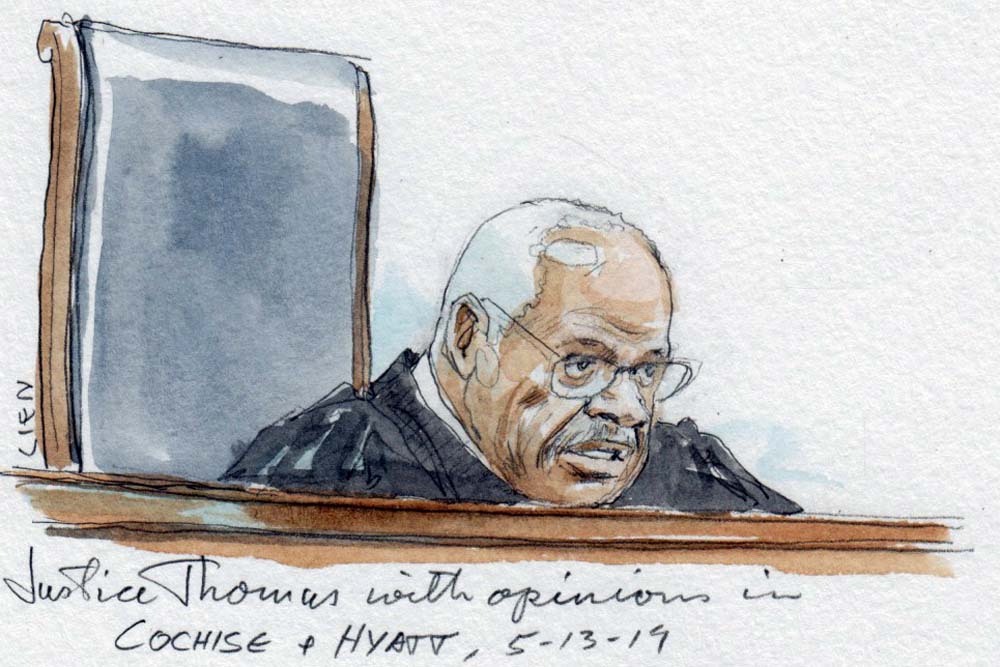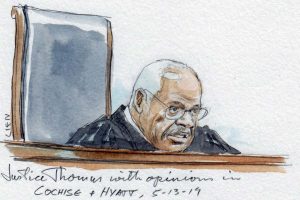Opinion analysis: Hyatt fulfills expectations in a surprising way

on May 14, 2019 at 9:56 am

In an already familiar 5-4 lineup, the Supreme Court has overruled Nevada v. Hall, which for 40 years has stood for the proposition that states generally lack sovereign immunity in one another’s courts. The new decision vindicates a legal position long held by conservatives, but it appears to endorse a loose approach to finding structural principles in the Constitution. The ruling also adopts a less than exacting view of stare decisis — hardly surprising for Justice Clarence Thomas, who wrote the opinion of the court, but odd given that other members of the majority, particularly Chief Justice John Roberts and Justices Neil Gorsuch and Brett Kavanaugh, have expressed greater concern for precedent. Time will tell whether Hyatt has set the stage for overrulings to come.
Hyatt involved a long-running suit by a Nevada resident against the Franchise Tax Board of California. The plaintiff, who filed suit in Nevada court, alleged a number of torts and initially won a huge damages award that has been whittled down through years of litigation. In fact, Hyatt is a “threepeater,” in that it has now reached the justices on three separate occasions. One possible explanation for this remarkable distinction is that there do not appear to be many cases involving successful state-court suits against other states. As a result, the justices have a hard time getting access to the sort of federal-courts questions that Hyatt tees up. The juiciest of those questions had to do with state sovereign immunity: Can a state like California assert sovereign immunity to defeat a lawsuit in the courts of another state?
In Nevada v. Hall, the Supreme Court answered “No.” But that was in 1979, before the Rehnquist Court had breathed new life into the doctrine of state sovereign immunity. In later decades, the court repeatedly distinguished Hall and expanded state immunity. And Hall is in some ways an awkward fit alongside those newer rulings. If states generally benefit from sovereign immunity in neutral federal courts, it is hard to see why they shouldn’t have the same advantage in the more partial courts of other states. As a result, many have assumed that Hall represented little more than a relic of an older view of state prerogatives. On its face, Hyatt vindicates that long-conventional understanding.
Yet the more recent Rehnquist Court decisions had acknowledged a plausible rationale for Hall. Even if the federal government lacks authority to override state sovereign immunity in federal court, the Constitution may have left states free to override the immunity of other states. On that view, Hall actually vindicated an important aspect of state sovereignty — namely, the sovereign authority to recognize or disclaim common law and international law forms of sovereign immunity. And although such an authority might sound troublesome, experience suggests the opposite: After Hall, there has been no explosion of state-court suits aiming to overcome the sovereign immunity of other states.
In overruling Hall and expanding state sovereign immunity, the court’s opinion in Hyatt started with some foundational points. “The Constitution’s use of the term ‘States’ reflects” traditional immunities, famous founding-era figures are on record making absolutist-sounding statements about state sovereign immunity, and the Supreme Court’s curtailment of state sovereign immunity in Chisholm v. Georgia prompted a popular backlash in the form of the 11th Amendment, which prohibits federal courts from hearing certain lawsuits against states. Yet the 11th Amendment by its terms does not apply to state-court suits. So, as in so many other sovereign immunity decisions, the historical recitation in the court’s decision ultimately served as the windup to an intuitive leap about what “makes sense.” As the court put it in Hyatt: “the spirited historical debate over Article III courts and the immediate reaction to Chisholm make little sense if the Eleventh Amendment were the only source of sovereign immunity and private suits against the States could already be brought in ‘partial, local tribunals.’”
True, sovereign immunity was once a matter of common law or comity that any state could choose to override. And, based on that fact, one might worry that the framers’ absolutist-sounding statements about state sovereign immunity weren’t actually so absolute. But the court insisted that the Constitution changed the old rule. To support that claim, the court offered a litany of constitutional provisions, such as a limit on state war powers, that on their face do not pertain to state sovereign immunity. The court posited that it would be “ahistorical literalism” to ignore these provisions, even though the court had adduced the provisions to fill a gap in its historical argument. Commentators have noted that Hyatt’s loose structural reasoning seems at odds with originalism and even resembles the position set out in Griswold v. Connecticut, in which the Supreme Court drew on apparently unrelated constitutional provisions to establish a right to use contraceptives.
Hyatt’s willingness to rely on loose structural argumentation draws attention to recent generational changes in conservative legal thinking. The court cited important scholarship by Ann Woolhandler, James Pfander, Caleb Nelson, Bradford Clark and others, but neglected a bracing amicus brief by Will Baude and Steve Sachs. In short, Baude and Sachs argue that states should be free in their own courts to abrogate one another’s sovereign immunity but that any resulting judgments are generally unenforceable. That position could have pointed the way toward a more pragmatic rationale: If the Baude-and-Sachs solution of preserving Hall and combining it with a rule of non-enforceability would have been unworkable, then the court might have been justified in establishing a constitutional rule of state sovereign immunity as a way of implementing historical practices.
And what about stare decisis? True to form, Thomas’ opinion for the court did not go long on the importance of precedent. Instead, the court’s one-page discussion noted four factors: “the quality of the decision’s reasoning; its consistency with related decisions; legal developments since the decision; and reliance on the decision.” Treating the second and third factors as equivalent, the court quickly stated that the first three all supported overruling. That left reliance — but the court brushed that worry aside, too. True, some plaintiffs had relied on Hall, but “in virtually every case that overrules a controlling precedent, the party relying on that precedent will incur the loss of litigation expenses and a favorable decision below.” Notably, the court made no effort to satisfy one of the three criteria for overruling that Kavanaugh had emphasized during oral argument — namely, that there be “severe practical consequences” to retaining the precedent.
Justice Stephen Breyer wrote a brisk dissent — 13 pages against Thomas’ comparably succinct 18-page majority decision. The tone of the debate suggests that both sides viewed the stakes in this case as small. Though it overruled precedent on constitutional grounds, Hyatt is unlikely to affect many suits and so is more of a cleanup than a teardown. Still, Breyer did more than just dispute the historical record and invoke stare decisis. Recognizing that Hall itself had engendered little reliance, Breyer also pointed to concerns that arguably arise in every instance of overruling. “Each time the Court overrules a case,” Breyer noted, “the Court produces increased uncertainty.” Breyer’s argument here would have been stronger if he had weighed the uncertainty associated with overruling against the benefits, such as greater coherence and simplicity, that come from correcting anomalous precedents.
Breyer then offered a thinly veiled warning. After citing the stare decisis factors famously adduced in the important abortion-rights decision Planned Parenthood v. Casey, Breyer ominously observed, “Today’s decision can only cause one to wonder which cases the Court will overrule next.” The message here is not subtle. Casey was made possible by Justice Anthony Kennedy, who has now retired. And Hyatt ignored the strong stare decisis requirements that marked Casey. So perhaps the “next” overruling will involve abortion rights — another longtime target of conservative opposition.
Or perhaps not. Breyer’s warning echoed Justice Thurgood Marshall’s 1991 dissent in Payne v. Tennessee, which likewise reacted to a divisive rejection of precedent. In words that Breyer could have borrowed, Marshall wrote that the Payne majority “ominously suggests that an even more extensive upheaval of this Court’s precedents may be in store.” Marshall, too, was worried in part about the fate of abortion rights. And it is indeed natural to think that a cleanup today could generate a teardown tomorrow. But when the next case actually arrived, the court decided Casey — in favor of precedent.



